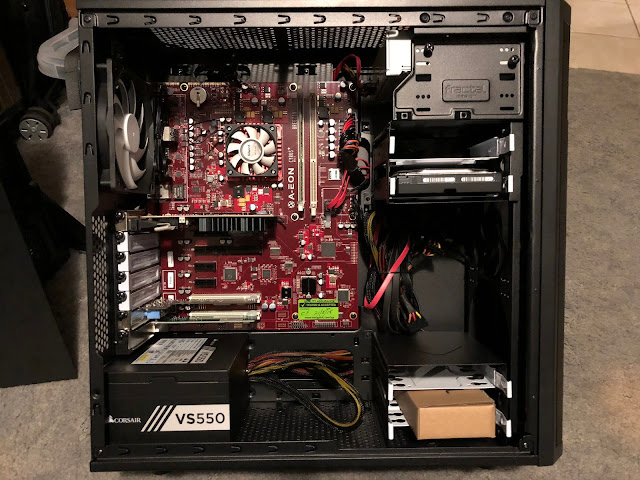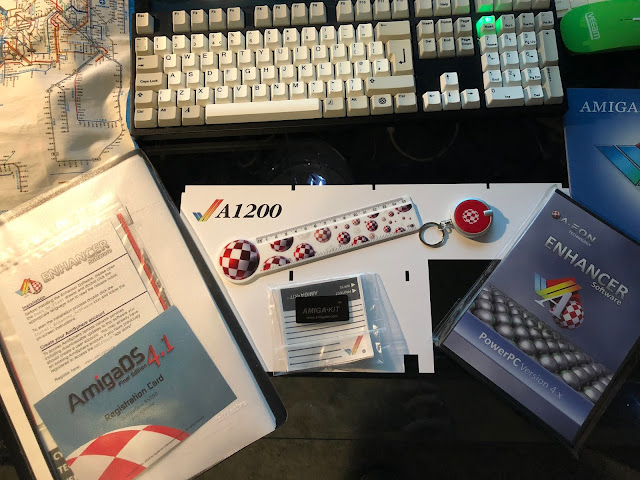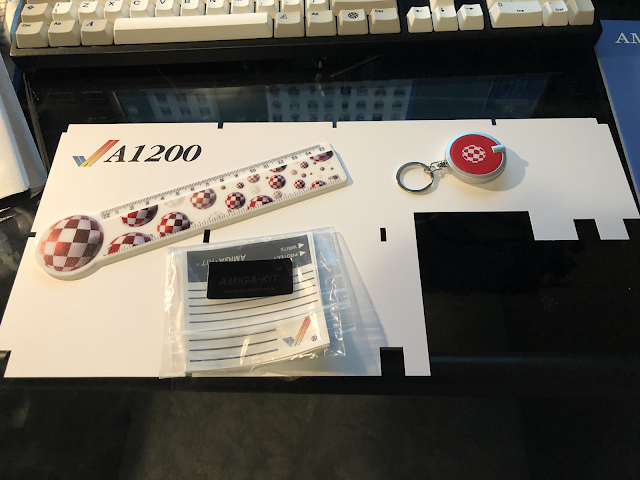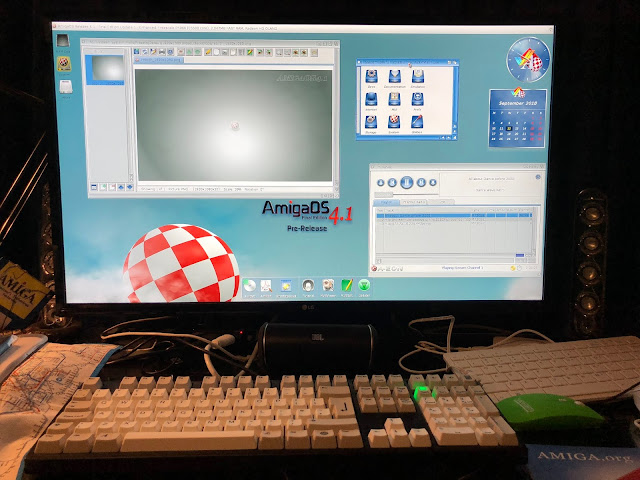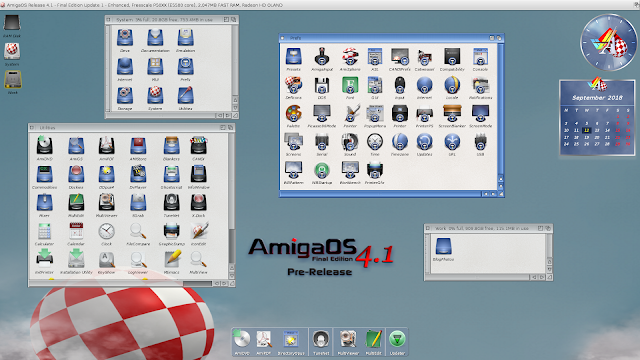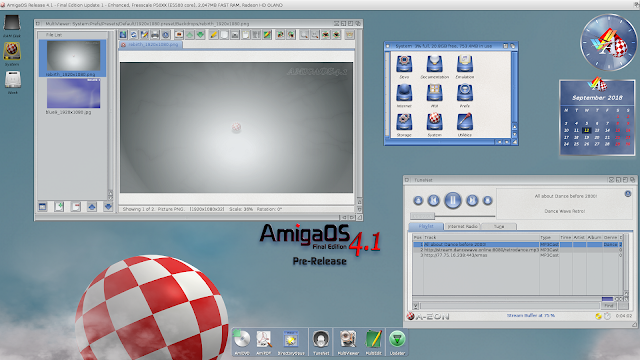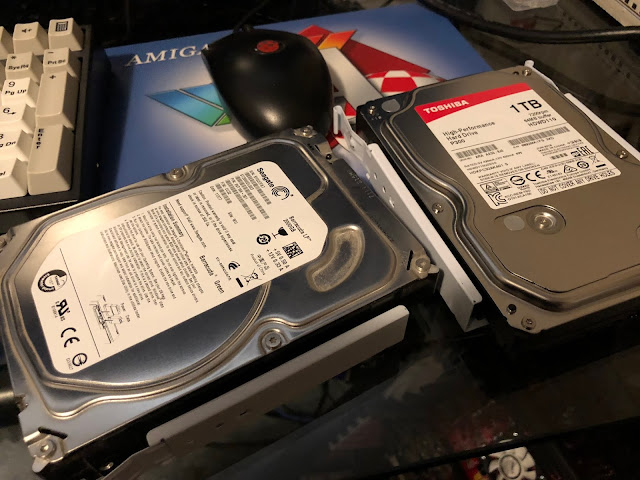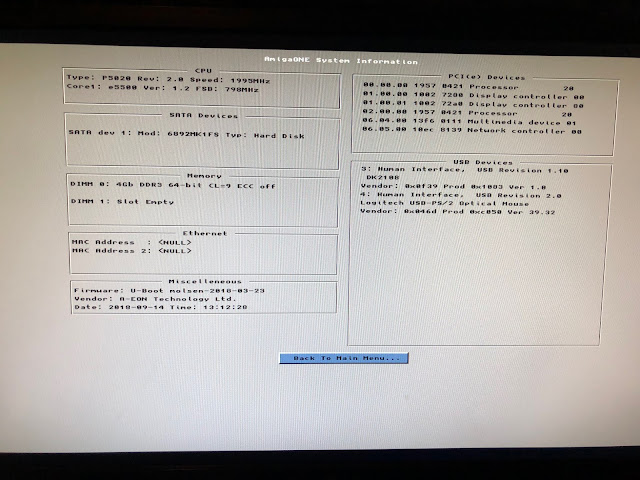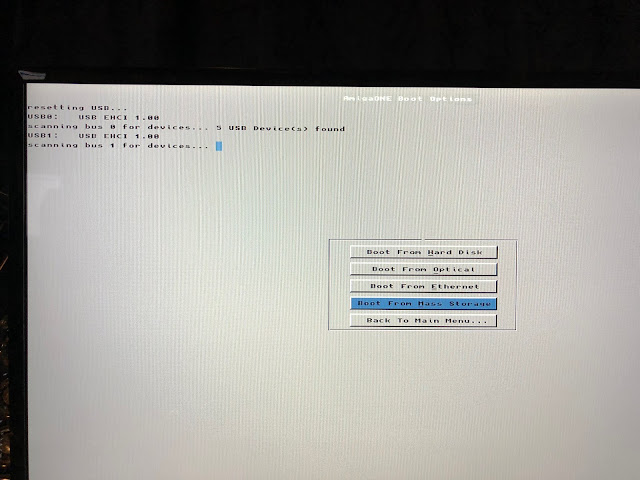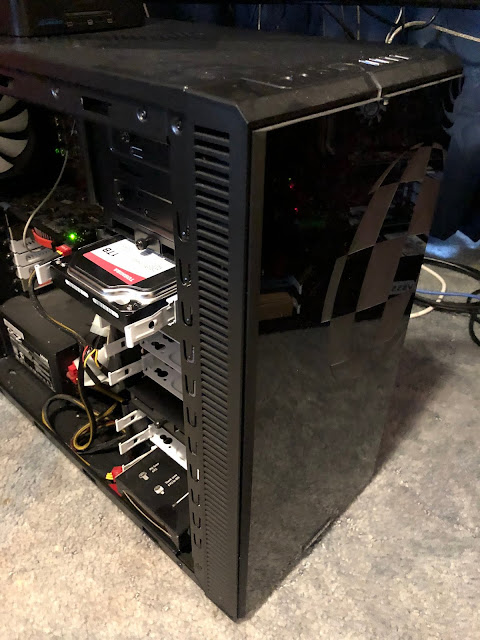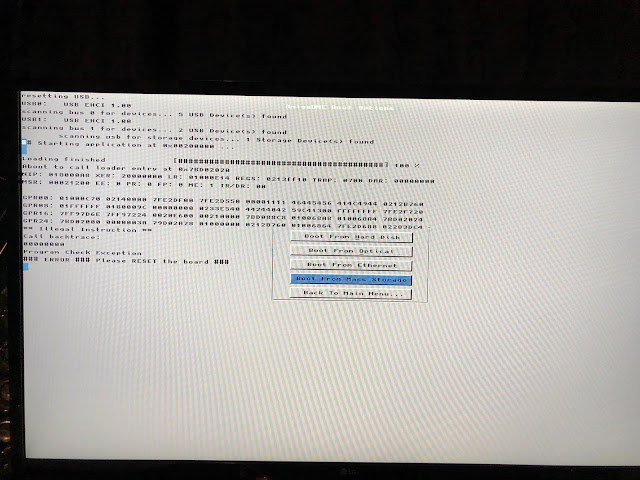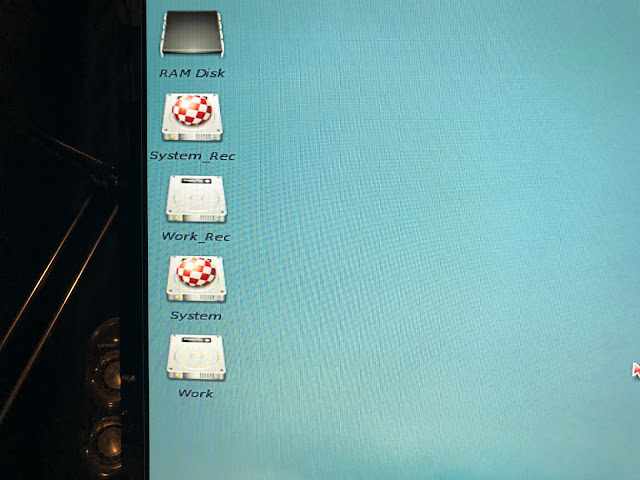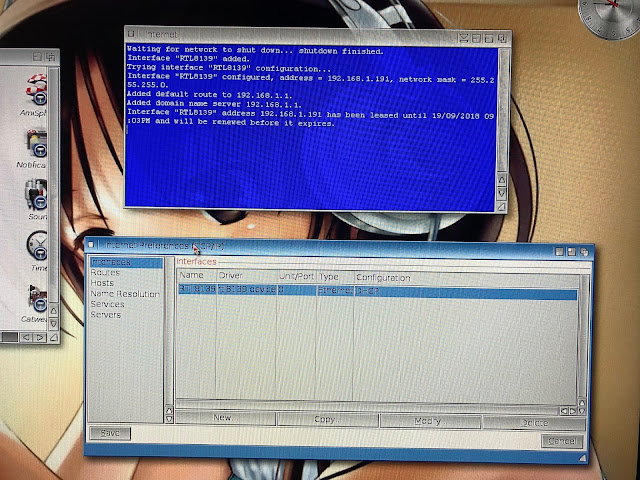My AmigaOne X5000 has arrived!
I am very excited to say that I finally saved up the money to get a AmigaOne X5000, and it arrived in the post this past week from AmigaKit in the UK. To say I am very excited to receive it is an understatement.
I opted to purchase the full system in the case with the Boing ball cover and X5000 logo:
The case is smaller and lighter than my AmigaOne X1000 case.
Here it is side by side with my AmigaOne X1000 and Sam460CR systems. The A1222 is sitting on top of the Sam460Cr and is mostly not in view:
Next I took off the X5000 case to take a look at the interior:
I decided to include a 1TB hard disk, 4GB memory upgrades with this X5000 system.
I realise that the X5000 has been available for some time, with many articles covering it in some detail. So I won't go crazy with 10 million photos of the board - it is well documented already. But I am so glad to finally have one of my own:
The cardboard box inside the case located in the bottom bays contains the tower case spare parts and most importantly the recovery AmigaOS 4.1 Final Edition USB stick.
I checked all the X5000 internal cards and cable connections to ensure everything was connected as it should be after it's long trek from UK to Australia!
Here is the rear view of the X5000, showing the usb ports, network ports and serial port for troubleshooting. There is a PCI sound card and network card in the bottom of the expansion bays.
Unlike the X1000 the X5000 doesn't have onboard sound so the sound card is necessary. The X5000 does have network driver support for the onboard network ports, but they still include an extra RTL8139 PCI network card with the system too.
Included with the system is the Enhancer Package CD, AmigaOS 4.1 Final Edition registration card and X5000 technical reference manual. Unlike earlier systems there is no AmigaOS 4.1 final Edition CD included since the version released on the X5000 is a Prerelease version.
Instead, as mentioned earlier, there is a recovery USB stick to restore the system if something goes wrong with the hard disk installation that comes with the system.
I quickly hooked up the system to try it out.
I am pleased to say it booted up first time with no problems!
The default AmigaOS 4.1 final Edition Update 1 installation has Enhancer pre-installed, but initially using a low screen resolution (presumably for maximum monitor compatibility)
I quickly fixed that - 1080p tested and set using Screenmode prefs:
I also received a Boing ball keyring (with torch light), AmigaKit floppy disk labels with Amiga checkmark, and a Boing ball ruler:
The floppy disk labels will come in handy for me as I have some disks that need relabelling, and the torch on the boing ball key ring has already come in handy!
I quickly fired up Tunenet and got some internet streaming music going while checking out some of the backdrops with Multiviewer - both part of the Enhancer package installed already with the X5000 out of the box:
Here are some screengrabs of the X5000 in action:
I was thinking to add my 2TB SATA disk to the X5000, but I will need to add a SATA PCI-e card to the X5000 first - it only has two SATA ports onboard - one is used for the DVD drive and another for the 1TB hard disk.
I would have to take out my SATA card from the Sam460CR to add the extra drive. This would render the Sam460cr inoperable since it has no onboard sata and needs the card. I might still do this though as I rarely use the Sam460cr these days. I might pick up another SATA card to backfill the sam460cr...
I am hoping to use the extra drive to host data for Linux and MorphOS builds on the X5000 in the future.
Unlike the X1000, the X5000 uses the UBoot firmware (similar to what is used on the Sam460Cr and also the upcoming A1222). You have an Early startup menu (like the Classic Amiga one) accessed by pressing enter while the X5000 boing ball animation boot screen is running.
The firmware is stored on a MicroSD card on the board, making upgrades easier to do and easy to revert in case of problems. This is also on the A1222 system board too.
From the UBoot early startup screen you have the option to boot AmigaOS, MorphOS, Linux, other boot options and System Information.
This is the System Information screen:
On the Other Boot Options menu option, you have the ability to Boot from hard disk, via DVD, Ethernet or USB Mass storage (which includes USB flash drives):
Booting from USB from UBoot is a new feature I haven't played with before. The recovery AmigaOS 4.1 Final Edition Update 1 USB stick included with the X5000 can be booted by using this menu option:
My issue here is that everything I use is on my X1000. Well over 700GB of stuff, not to mention the 6 years of customisation, upgrades and configuration of AmigaOS4.1 to get it the way I like it.
I really don't want to do all that work again. (Yeah I know, lazy Australian, etc)..
The X5000 hard disk (1TB) is split up into 20GB for the System drive, and the rest for Work partition.
I do plan to put MorphOS on the machine at some point, so it was necessary to use Media Toolbox to delete and recreate the Work partition to use 800GB instead of all of the space, leaving enough room to put a MorphOS system partition and Linux partition. The Work partition was empty as delivered, so nothing was lost by doing this step. I renamed Work to Work2 temporarily (you'll see why in a minute)
I read that MorphOS needs to be installed on the primary hard disk so I think this resizing step is quite important to avoid having to do everything again later on...
With that done, I then took out the sata hard disk from the X5000 and installed it in my X1000 for the large data transfer:
My X1000 already has two hard disks in it, the second one being for Linux. So I simply removed the Linux drive and swapped it with the X5000 drive.
With the X1000 now booted up, I needed to use the Mounter tool in the System drawer to mount the Work2 partition. This is because the device names (DH0 and DH1) are the same as the X1000 system drive partitions...
When the X1000 mounted the Work2 partition from the X5000 drive, it was easy to tell the two partitions apart by the name to avoid mistakes, which is of course why I named the X5000 partition Work2 temporarily..
With the disk mounted I set to work copying the 700GB of data from my X1000 Work partition to the X5000 Work2 partition. This took a number of hours to complete, so I just let it run.
On completion, I then created a X1000_System drawer on the X5000 Work2 partition. I then copied the full System partition from my X1000 to that drawer.
When that was all completed, I took the X5000 drive out and put it back into the X5000 system and booted up the X5000, now with all my data from the X1000. I renamed the Work2 partition back to be Work again.
With that done I then created a new drawer on the Work partition called X5000_System, and copied everything from the System partition to this drawer.
At the end of this process, it meant I have a full backup of the X1000 and X5000 System partitions on the Work partition on the X5000. This I believed was good insurance for the stupid thing I planned to do next...
I really, *REALLY*, didn't want to have to do all the work and configuration I did on the X1000 again on the X5000.
I decided to copy the X1000 System drawer contents over the top of the X5000 System partition. Yeah I know, stupid right?
And so it proved. I thought I could stop problems by changing the System:kickstart/kicklayout file to be the X5000 version and not the X1000 version.
I was partially right but not completely. I also removed the catweasel DF0 dosdriver since it is not installed on the X5000 and know it would cause problems. I thought that would be enough - I was wrong. Don't do what I did!
Sure enough, after rebooting the system wouldn't boot. I realised what I did wrong instantly but fixing it meant using the USB recovery stick since I could no longer boot to a working system.
When I tried booting from the USB recovery stick using the UBoot Other Boot options menu and selecting Boot from Mass Storage menu option, but it continued to boot the Sata disk everytime and fail, even though the USB stick was installed:
To resolve this, I removed the 1TB SATA disk from the X5000, and connected it to the X5000 via a SATA to USB adapter instead, after the USB recovery stick had loaded successfully on the X5000.
Note also that the USB recovery stick should be installed in the bottom USB ports at the back of the X5000.
Removing the SATA disk allowed the Recovery USB stick to boot as expected:
Yes, I have a Workbench screen again!
The lesson here - listen to your inner voice when it says you are doing something stupid. It is normally right :-)
The USB stick uses ADH0 and ADH1 device names, and System_Rec and Work_Rec partition names, so it doesn't clash with the 1TB SATA disk partitions at all :-)
With the USB AmigaOS 4.1 Recovery stick loaded, and the SATA disk connected via the USB to SATA converter, I could see the partitions (as above) and now fix my mistake, all thanks to taking a full backup first.
Of course I wanted to fix my mistake, but still don't want to lose my X1000 configurations. I don't want to do that work again. It took my 6 years of playing around to get it where it is.
So, to fix the problem I created copying the X1000 System backup drawer contents over the X5000 system drive, I first copied the full Kickstart drawer contents from the X5000 backup drawer on the Work partition to the System:Kickstart folder. This restores all the critical modules needed for the X5000. This was my main mistake in the process - I forgot to do this step, and only restored the kicklayout file.
I then did the same copy process for the Devs drawer and C drawer as the X5000 version contains different versions of programs to the X1000 contents.
These steps still keeps all my X1000 installed programs since it would only replace the X5000 needed files and not everything. I avoided copying over Prefs, S, etc, since all my X1000 settings and customisations are in there.
With that done, I then turned off the X5000, removed the USB stick and reconnected the 1TB SATA disk back into the X5000 SATA port.
On X5000 boot up on the SATA disk I could now get the Workbench again - success, and relief! In addition it now it has my full X1000 setup and customisations too! :-)
But I needed to fix up the internet settings for the network adapter, as the network adapter used in the X5000 and X1000 is different. I removed the incorrect X1000 adapter and added in the RTL8139 adapter in the X5000, restarted the network services and this was fixed.
So after some bumps in the road, I now have successfully moved my X1000 setup to the X5000 :-)
I also learnt a lot about how to recover the X5000 system, which is a good thing to know. Admittedly I didn't expect to have to learn it so soon but hey, it's all ok now.
I need to address some other points, like replacing Altivec versions of video players, etc, with non-Altivec versions as the X5000 doesn't have Altivec support, and linked library references but that will come later.
Something to note with the X5000 is that the USB ports on the top of the tower case don't work. This is because they are USB 3.0 ports and the X5000 board doesn't have support for those ports.
The A1222 board had the same issue with the case I bought for it, and I solved it with a USB 3 to USB 2 header converter cable.
I have a lot more to do yet with this X5000, but I will cover this in future blog entries. I am very glad to have the system at last!



